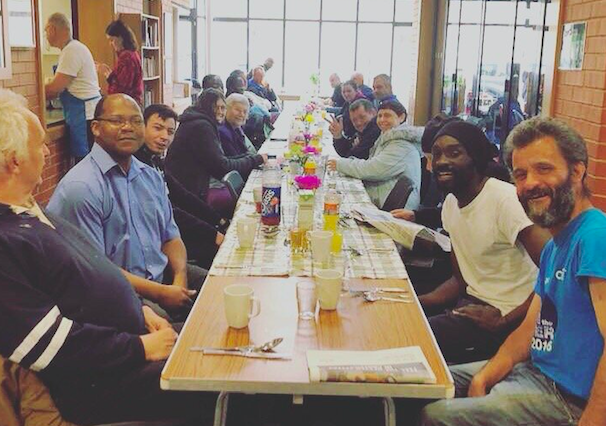This contribution to our on-going discussions about the Labour Party was written by Kai from Plan C Manchester.
Depending on who you ask, the Labour Party is either becoming a new social movement or it has become a highly effective revolution-prophylactic. Still others hedge their bets and say it demonstrates both ‘tendencies’. In any case, a question has been raised about how the radical left responds. It is a deceptively simple question: Should we engage with the Labour Party? Yet it invites several follow ups: If so to what extent? If so how? If so when? And at what level? For how long? And since as the radical left we are critical of parliamentary politics, how are we to critique it? What is the role of critique? And where are its limits? Should we provide support to some aspects of the Labour Party and condemn others? Won’t this confuse matters or undermine the whole project? Or is the Labour Party simply part of the problem? In short, what are we, as the radical left, to do?
Two broad responses to these questions are emerging with two opposed paths of action. The first I call the ‘Critiquer-in-chief’, the second calls itself ‘critical solidarity’. There is little new in these positions, they can be found in any number of radical debates. It just so happens that today we find them lurking in the corners of the ‘Labour Question’. Let me preface what follows by saying that few commit absolutely to either position. Instead, they operate as poles of attraction pulling our debates this way and the other. They are caricatures that despite their absurdity shape our politics. Here, they are presented at their starkest and most cartoonish. I do this to draw out the underlying complicity of more ‘nuanced’ arguments that nonetheless draw from these positions and to push decisively beyond them.
1) The Critiquer-in-Chief
The critiquer-in-chief has made critique the terminal point of their politics. They have raised Marx’s maxim to conduct a ‘ruthless criticism of all that exists’ to the point of religiosity. They understand that critique is an essential part of political struggle. That it can reveal what we spontaneously think of as fixed and natural to be in fact mutable and social. They know that critique can isolate the weak links in capital, the possible points of leverage, key industries, and so on. Because the critiquer-in-chief values critique so highly, they have become remarkably proficient at it. We all know the type. They thrive in academia and in certain leftist forums. Yet they thrive here only because both are the rarest of things: places where critique alone is thought an accomplishment.
The problem with the critiquer-in-chief is that they do not follow the negative moment of critique with an affirmative moment of commitment to anything beyond critique. They are content with a mix of the following. 1) Holding existing struggles up to an unobtainable standard. Thereby, safeguarding their position as critiquer-in-chief. 2) Dogmatically reciting the critiques of past generations without due consideration to changes in the social fabric. Thereby, ironically, forgetting to critique the critique. 3) An endless deferral of the affirmational moment in the interest of self-reflective criticism. Here, an obscene leftist super-ego announces itself as the critiquer-in-chief turns their formidable powers against themselves: ‘Does this not simplify matters too much?’ ‘Have we been sufficiently inclusive?’ ‘Have we considered the unknowable consequences of our actions?’ This is not to say that self-reflectivity is bad. It is, however, to say that in the hands of the critiquer-in-chief it becomes an obligation for self-flagellation. 4) Advocating forms of organizing that are no longer (if ever) able to build power. Grand transient gestures of defiance, or, momentary affirmations of our place as workers/renters, or, a leap to the Party-form with no indication of how to get there, or, an overbearing attention to the spontaneous self-organization of the working classes with little thought given to organizational forms to sustain that power. This last habit looks like an affirmative gesture but do not be fooled. Its ostensibly affirmative appearance makes it all the more effective at condemning existing struggles.
All four of these habits ensure that absolutely nothing changes. We remain the ‘radical left’; adept at critiquing the vagaries of capital, utterly inept at building and sustaining power.
2) Critical Solidarity
The second path is well-aware of the need for critique but aims to avoid the hole that the critiquer-in-chief has dug for themselves. Less inclined towards a ‘ruthless criticism of all that exists’, they wager on existing struggles and movements. Their politics is far to the left of these struggles but tentative and ‘critical’ support, a position of semi-detached-attachment, is favoured over the position of critiquer-in-chief. This, however, comes with its own difficulties. 1) They read into struggles a ‘working class consciousness’ that is nowhere present. In cases where it is present it is assumed to be inherently revolutionary when all evidence may be to the contrary. 2) They consider the fact that there is struggle and that the same faces are showing up to be an achievement. Thereby failing to consider that it could equally be the case that the same group of people are interminably trying the same failed tactic. 3) They over-emphasise the capacity of the radical left to impact liberal movements and socio-democratic politics. Thereby forgetting that the form of social democracy, let alone its content, is structured to negate their influence.
Again, all three habits ensure that absolutely nothing changes. The ‘critical’ part of their solidarity merely provides a face-saving distance between the individual and the cause. In this they concur with the critiquer-in-chief: it would be politically uncouth to commit oneself fully to a political project. Thus, like the critiquer-in-chief, ‘critical solidarity’ renders the left inoperative. Weak and uninfluential, wagering on a non-existent power to shape the course of social-democratic movements, it is a drop in an ocean trying to make waves.
3) Plan C
It is clear that these are two sides of the same coin. Neither the critiquer-in-chief nor critical solidarity can build the organizations and forms of consciousness that are necessary for a sustainable politics beyond what we have elsewhere called ‘Plan B’. Firstly, because both need Plan B for their political existence. The critiquer-in-chief simply needs something to critique. No Plan B, no grist for the mill. Whilst critical solidarity needs the false sense of accomplishment that it gains from within its movements. Secondly, because both assume a non-existent ‘We’ capable of conditioning a radical politics. The former assumes a ‘We’ that can function as the condition of critique. But it only under-writes the legitimacy of critique insofar as it is never aired. To express it would be to risk the possibility of being deposed from the station of critiquer-in-chief. The latter assumes a ‘We’ that is powerful enough to influence the course of social democratic politics. A ‘We’ with the power to turn the state against its form and to transmute its function as a medium of exploitation. Whilst this might be possible down the line, the left is in no position to attempt it now. When we are in such a position, it will no longer need to be done.
What we need and have always needed is a Plan C. This would be a course of action that takes the best of both the critiquer-in-chief and critical solidarity and moves decisively beyond them. From the critiquer-in-chief we must learn critical expertise. But these expertise must be pushed forward. We must learn to think the communist future and not just the limits of Plan B. From critical solidarity we must take the courage to risk a political course of action. Again, we must push this forward. We must risk genuine commitment to something beyond the present and not just critical solidarity with Plan B’s movements. The vital step, then, is to combine the two paths with a properly affirmational moment. A commitment to, a wager on, Plan C. This means no longer posing the question ‘Should we engage with the Labour Party?’. It is a question that already assumes too much. It fakes a ‘We’ that is nowhere present and that must be created.
This ‘We’, a united front against capital, can only be created in collective struggle. Yet this struggle cannot take the concerns of Plan B as its frame of reference. Instead, it must aim to build sustainable organizational power against Plan B. The precise form that this struggle will take is being decided as it develops. What is already clear is that it will be something more enduring than passing expressions of defiance. It must learn to channel these indispensable moments into a persistent organizational power. It will also be something far greater than ‘counter-power’; a term that always implies a reactionary stance to power proper. It will perhaps be something far closer to the now unfashionable term dual power. A force that can leech away the legitimacy of the nation-state and bring power back into the hands of the oppressed, the exploited, and the destitute. This will not be done by ignoring the state as if it were not within our political field. Rather, it will be achieved by a series of actions and demands made against the state. Elsewhere we have called this strategy the ‘directional demand’. The open secret of an effective directional demand is that its audience is not the state but the collective that the action or demand rallies against it.
In Plan C, we have been thinking about this in terms of the social strike, radical municipalism, international solidarity platforms and the commons. We are well-aware that these have their difficulties. What they share, though, is a desire for something far beyond Plan B. A desire for a united front against capital and the institutions that buttress it. Our question is nothing short of how to build the necessary power to invent a communist future. Already in this series of papers we have seen various ideas of how to achieve this aim. As our internal and external discussions continue, we should let neither a critique of, nor engagement with, the Labour Party distract us from this more essential problem. This is not to say that the key events of parliamentary politics are not of strategic significance to us. The point, however, is to avoid allowing the state to set our political agenda. If our practice assumes either the centrality or permanency of parliamentary politics we are lost. Instead, we should ask ourselves long and short-term strategic questions that look beyond Plan B: How do we constitute a ‘We’ that can exert its political will? How does this ‘We’ drain parliamentary politics of its legitimacy? How does this ‘We’ interact with the state without collapsing into the state? What position do we want to be in by the next election? How do we get there? Is it strategically preferable for the Labour Party to be in power? Why? Is the left ready to respond decisively if they are? Is it ready to respond decisively if they aren’t?
This process of questioning begins by being honest with ourselves. If Labour looks to some like a new social movement it is only because it has provided an alternative vision for society. It at least appears to offer hope in something beyond the present. For this reason, it is foolish to reproach those among us who have involved themselves with it. It is why we should not reprimand younger activists for their narrow parliamentary politics. Instead, we should recognize that both are expressions of a desire for collective belonging against the present. In this respect, we should admit that the Labour Party has out-flanked us. As its election manifesto demonstrated, Labour has ideas about the future. Indeed, according to Paul Mason, the manifesto and the narrative surrounding it had appeal well-beyond the anticipated Labour base. The fact that these ideas are for a new neo-Keynesian social compromise is almost irrelevant. The lesson to be learned from all this is to provide – and to fight for – something more than Plan B.
4) Here Come the Commons
To conclude, then, let me briefly address one of the issues Plan C is wrestling with: the commons. It is my contention that an adequate politics of the commons immediately puts us beyond the bounds of Plan B and those whose politics depend on it. The key to the commons is that it renounces private property and the abstract rights-bearing individual in favour of the commonly held and commonly produced. It is the commons, increasingly under assault, enclosed, constrained, and privatized, that justifies the discourse of communism today. You can read more here.
It has been argued elsewhere in this series that we need a de-centred approach to the Labour Party. That instead of taking Plan B as our point of orientation we should emphasise a ‘diversity of practices and processes’ that reconfigure how we relate to each other. No doubt this is essential at a time when the ‘We’ that the critiquer-in-chief and critical solidarity fake is nowhere present. The patient work of attending to extra-parliamentary practice, processes and institutional arrangements is crucial to building the power necessary to exert political will. But the question to pose is this one: Is not a politics of the commons, properly conceived, the missing supplement to this proposal? And could it not operate as the necessary point of convergence for this diversity of practices and processes?
Perhaps what is needed is a set of ostensibly modest directional demands, constructed around the commons, that can orient our collective practice and constitute an as yet non-existent ‘We’. It is crucial to remember that the task of building collective power and asserting a political vision remains essential irrespective of who sits in parliament. After all, even if Labour does come to power the best one can expect is tax increases on corporations and high-income earners, the nationalization of some sectors, the rolling back of NHS privatization, and some government borrowing to alleviate pressure on the working classes. This would be commendable were it achievable. Unfortunately, form and content are not on Labour’s side. In terms of content: today’s global context means that any parliamentary force is in a balefully weak position to guarantee even these most basic reforms. And that is before you consider the Labour Party with its complicated internal mix of ‘tendencies’ that show no sign of resolving themselves in the near-future. In terms of form: parliamentary politics has unremittingly proved itself ruinous to leftist causes. To date, no one has come out alive from the long march through the institutions, whilst Owen Jones’ myth of a ‘peaceful revolution’ is just that.
The trap to avoid, then, is a politics of buttressing Labour against the inevitable onslaught of global capital and mainstream media. No doubt, should this come to pass, it will look like a great flurry of political activity. An ‘ecology of organizations’ will take to the streets in symbiosis with the Labour Party: ‘If you listen to us, we will defend your legitimacy!’ But this is Plan B in its element. Movements swept up by Labour will find themselves tied to a parliamentary machinery that is unwilling or unable to waver from its course. They will be forced to delay their political agenda lest they make Labour appear out of touch with its base at a time when global capital is out for its blood. Despite the all the activity, then, the terms of the debate will remain the same: privatization vs. nationalization, higher taxes vs. lower taxes, government borrowing vs. austerity. The critiquer-in-chief will relish in pointing this out. Those in critical solidarity will be too busy to care.
A well-designed set of demands constructed around the commons begins from elsewhere. Against the false choice of the two: ‘Neo-liberal capitalism or Neo-Keynesian capitalism?’ ‘Theresa May or Jeremy Corbyn?’ ‘Capitalism with or without a friendly face?’ Directional demands for the commons introduce a third: an orientation towards genuine emancipatory struggle. Their function is nothing short of restructuring the field of the possible by providing a point of collective orientation outside of Plan B. Neither nationalization nor privatization. Neither parliamentary politics nor its extra-parliamentary adjunct. The commons are that which we collectively produce and that we must collectively defend. Directional demands for the commons, meanwhile, give this project a definite form. They inscribe a gap between a properly communist politics and the rest. They put an end to questions about what precisely the left is for. They remind us that our task is to reject the terms of the debate without wandering off into the political wilderness. And, importantly, they stop the dual temptations of acting in critical solidarity with Plan B’s movements on the one hand or cynically appraising this tendency on the other. So rather than entering the interminable debate about whether we should or shouldn’t engage with the Labour Party, rather than fetishizing Corbyn by supporting him ‘from below’, why not start from elsewhere? Why not see if we can constitute a new political field with new ways of being together, organizing ourselves, and reproducing ourselves? In other words, why not learn to think and act against the present?





